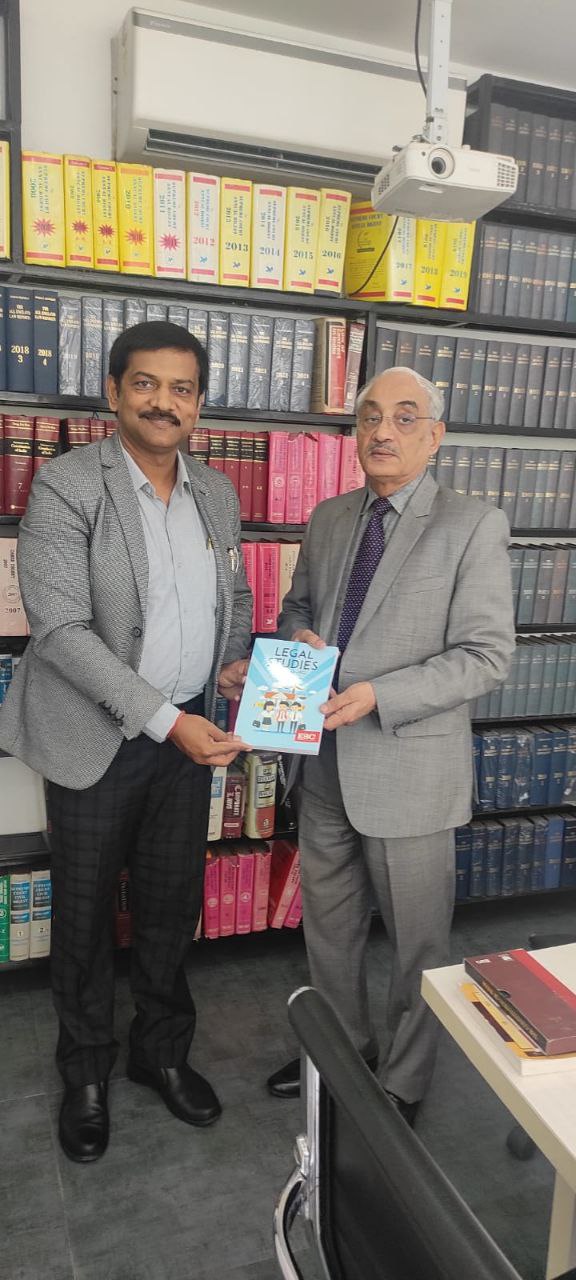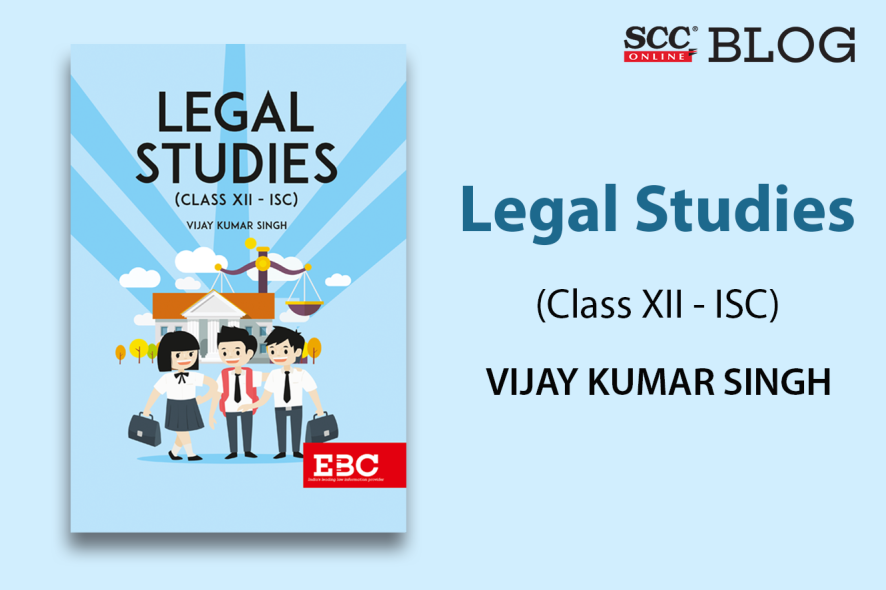About the book
Legal Studies Class 12 by Dr VK Singh is the second in the series of Legal Studies for the High School Students. Legal Studies is offered as an elective in Class XI and XII in both the CBSE and ICSE curricula in India. Though the topics covered in the book have been arranged as per the ICSE syllabus for Class XII, an attempt has been made by me to provide a well-knit perspective of the topics covered for general audience as well, who are interested in knowing the law and its implications in day-to-day life.
Basic knowledge and understanding of law is crucial for every citizen not only for exercising their rights but also for not falling foul of the law, as ignorance of law is no excuse as per the legal maxim “Ignorantia juris non excusat”. There is no day in our life wherein we are not confronted with one or the other laws. Generally, we are unconscious about it, until it hits us. School students do learn law briefly through various texts in the subjects of political science, civics, etc., however, studying it as an elective is different. Legal language has its own twists and turns which require specific treatment. This book introduces the path of learning legal studies and would be useful for students who are aiming for “law” as their profession as well as others who would contribute to nation building.
The National Education Policy 2020 (NEP) issued by the Government of India emphasises the need for interdisciplinary approach of study and the focus on exploratory learning.
Legal education needs to be competitive globally, adopting best practices and embracing new technologies for wider access to and timely delivery of justice. At the same time, it must be informed and illuminated with Constitutional values of Justice—Social, Economic, and Political—and directed towards national reconstruction through instrumentation of democracy, rule of law, and human rights. The curricula for legal studies must reflect socio-cultural contexts along with, in an evidence-based manner, the history of legal thinking, principles of justice, the practice of jurisprudence, and other related content appropriately and adequately… . (Para 20.4)
In this book, the author has covered various topics of law in seven units and several chapters. Some topics like dispute resolution and criminal law are in continuation from Legal Studies I. Unit I deals with intellectual property laws and is a very interesting dimension of law which protects intangible rights. It is a property which gets generated from the brain and rests in the form of trademark, patent, design, copyright, etc. All these dimensions of IPR have been covered in this unit. In 2022, WIPO celebrates the World IP Day (April 26) on the theme “IP and Youth: Innovating for a Better Future”. As the future leaders, innovators and creative thinkers of tomorrow, it would be a wonderful starting point for you to learn the basics of IP rights and laws associated with it.
One of the major functions of law and the legal system is providing clear rules and mechanisms for dispute resolution. Where there are people, disputes are bound to happen. Whenever disputes arise, a forum is needed to resolve it. Unit II of the book deals with the overview of the court system in India, justice delivery by Tribunals, the justice system in rural India and also Alternate Dispute Resolution (ADR). This unit is further supplemented by Unit V which specifically deals with the concept of free legal aid under the Legal Services Authorities Act, Lok Adalat as well as public services and law. This section is very useful and a must know for everyone.
Dr VK Singh presented a copy of the book Legal Studies Class 12 to Justice MM Kumar, Former Chief Justice of the J&K High Court and member of NHRC
Every day several crimes are reported in newspapers and the young generation must be made aware of basic understanding of criminal procedure. How does the criminal law is put in motion, what is FIR, how the criminal trial happens, etc. Unit III specifically deals with the crime and law of evidence.
While Unit I deals with intangible property, the law relating to tangible property is covered in Unit IV, including the law relating to trusts and wills and benami properties. The latest dimensions of illegal property and its treatment in law are also briefly covered. Unit VI introduces the concept of legal language, specifically the “legal maxims”, like the one which you read in the second paragraph of this preface.
The last unit of this book provides details about seven important laws, i.e. laws against corruption, negotiable instruments laws, competition laws, taxation laws, food safety laws, human rights laws, information technology laws and motor vehicle laws. Given that we are living in the digital age, it is very important to be aware about the interface of technology with law. NEP has also emphasised about this in the following words:
Data is a key fuel for AI-based technologies, and it is critical to raise awareness on issues of privacy, laws, and standards associated with data handling and data protection, etc. It is also necessary to highlight ethical issues surrounding the development and deployment of AI-based technologies. Education will play a key role in these awareness raising efforts. Other disruptive technologies that are expected to change the way we live, and, therefore, change the way we educate students, include those relating to clean and renewable energy, water conservation, sustainable farming, environmental preservation, and other green initiatives; these will also receive prioritized attention in education. (Para 23.13)
Review
I applaud Dr. Vijay Kumar Singh’s initiative to author a book aimed at secondary school students to expose them to the discipline of law and as a by-product encourage them to get a degree in the subject at the university level. He has already authored a book on Legal Studies for Class XI (ISC students). Quickly reading through the same, I must articulate that it is a great read for every Indian citizen. I am sure that this book on Legal Studies for Class XII (ISC students) will also serve the same purpose.
~Justice Swatanter Kumar
Former Judge, Supreme Court of India
Former Chairperson, National Green Tribunal

Dr VK Singh presenting a copy of the book Legal Studies Class XII to Justice Swatanter Kumar
About the Author
Dr Vijay Kumar Singh is Professor and Dean at the School of Law with UPES University Dehradun. Dr Singh is an experienced professional having worked at the Indian Institute of Corporate Affairs (IICA), a think-tank and capacity building institute under the Ministry of Corporate Affairs, Government of India as Head, School of Corporate Law and also with the Competition Regulator of India, the Competition Commission of India (CCI). Dr Singh has also been associated with the Hidayatullah National Law University (HNLU), Raipur as a faculty in corporate laws and securities regulations.
Dr Singh is a doctorate in law with basic degree in science followed by degrees in law with Gold Medals in his LL B and LL M examinations from Nagpur University. He has also completed his MBA in HR from IGNOU. He is a certified trainer on “Managing Disputes and Difficult Conversations on the Board” by the Centre for Effective Dispute Resolution (CEDR) and a mediator by ICADR. Dr Singh is an NCC “C” Certificate holder with “A” Grade.
Dr Singh has authored the book titled “Corporate Power to Corporate Crimes: Understanding Corporate Criminal Liability in India”. He is also the author of Legal Studies I, the first part of this Book, which has been widely appreciated by everyone. Dr Singh is an avid writer and has written a number of articles on different topics like sports law, money laundering, corporate governance, environmental law, CSR, competition, insolvency, comparative business law, IPR, business and human rights, and international trade/economic law. Visit SSRN Author page: <https://papers.ssrn.com/sol3/cf_dev/AbsByAuth.cfm?per_id=1113018> to read his papers.
Dr Singh has widely travelled around the world which includes his travel to Brussels, Austria, France, United Kingdom, Chicago (US), Beijing (China), Tokyo (Japan), and Kyrgyzstan. He is an invited resource person for several training and capacity building programs nationally and internationally on various subjects and topics.
Dr Singh is the Life Member of the Indian Institute of Public Administration (IIPA), the Indian Society of International Law (ISIL), the International Centre for Alternative Dispute Resolution (ICADR), the Indian Law Institute (ILI) and the Indian Council of Arbitration (ICA). He is also an associate member of the European Law Institute (ELI).
Table Of Contents
Unit I – Intellectual Property Laws
- Introduction and Historical Evolution of IPR
- Copyright Laws
- Law of Trademarks
- Law of Patents
- Law of Designs
- Law of Geographical Indications
- Protection of Plant Varieties
Unit II – Dispute Resolution
- Overview of the Court System in India
- Justice Delivery by Tribunals
- Justice System in Rural India
- Alternate Dispute Resolution
Unit III – Crime and Law of Evidence
- Law Relating to FIR and Arrest
- Criminal Trial
- Law of Evidence
Unit IV – Transfer of Property
- Introduction to Transfer of Property
- Law Relating to Mortgage and Leases
- Law of Trusts and Wills
- Benami Properties
Unit V – Legal Services Authority and Its Role
- The Concept of Legal Aid
- Legal Services Authorities
- Lok Adalat
- Public Services by the State
Unit VI – Legal Maxims
- Introduction
Unit VII- Important Laws
- Laws against Corruption
- Negotiable Instruments Law
- Competition Laws
- Taxation Laws
- Food Safety Laws
- Human Rights Laws
- Information Technology Laws
- Motor Vehicles and Road Safety Law
Class 12 ISC Syllabus
AIMS
Paper-I — Theory
Paper-II — Project work
Guidelines for teachers
Sample Paper 1
Subject Index
Purchase Link
A copy of the book can be purchased here Link to buy







